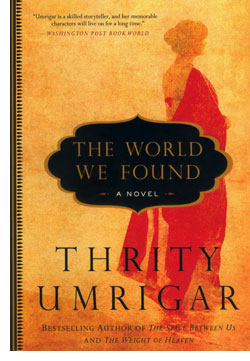 |
 Thrity Umrigar
Thrity Umrigar
The World We Found
Harper / HarperCollins
US Hardcover First Edition
ISBN 978-0-061-93834-4
Publication Date: 1-03-2012
306 Pages; $25.99
Date Reviewed: 01-29-2012
Reviewed by: Rick Kleffel © 2012
Index:
General Fiction
Misdirection is arguably the most powerful technique in the novelist's toolkit. It is the means with which places, people and stories are transformed by the readers' preconceptions and perceptions. It need not be a deliberate ruse used only in genre fiction. When misdirection rises slowly and inevitably from the organic structure of a story and the characters in that story, the sense of discovery is palpable and thrilling. Thrity Umrigar's novel 'The World We Found' ultimately proves to have a very appropriate title. Readers will surely find a very exotic world within, and it proves to be every bit as unpredictable as ours.
As 'The World We Found' opens we meet three grown women who have lived long past their youthful moments of bonding as a quartet of students in an India wracked by change in the 1970's. Laleh, once a sort of socialist firebrand, is now comfortably married to Adish, a well-to-do businessman. She flaunts her activist outlook from the easy comfort of her suburban life with hypocritical flair. Kavita, who is gay, is a quietly withdrawn professional with a lover and a low-key life. Armaiti moved to America, was married and is now divorced with a grown daughter, Diane. Even though none of them have seen one another or talked for many years, Armaiti discovers a reason to bring the Laleh, Kavita, and the fourth in their old group of friends, Nishta, to her in America.
Umrigar immerses readers with great ease in a culture most American readers won't find very familiar. On a prose level, the book is utterly transparent and stripped down. The result is a certain pleasing opacity, a showing without telling. This makes just getting to know these complex characters and their back-stories an enjoyable adventure. Umrigar manages the unique feat of writing prose that is atmospheric and dense, but smooth and enjoyable. She sprinkles in a few Indian phrases here and there in a manner that seems natural but lends real texture to the world she is building. 'The World We Found' is very easy to read, but a bit rough and ready. It may have been tough balancing act for the writer, but as readers we never notice.
Umrigar has a large cast in this book, all with lives that rise up from the history of India over the past fifty years. With no apparent effort, they each become distinct, nuanced and very entertaining to read about. The core quartet; Laleh, Armaiti, Kavita and Nishta, are seen both in their student days and in the present lives that grew from those days. The events of the past shaped their lives in ways that are universal, even if the events themselves reflect the specifics of Indian culture.
Umrigar creates four modern women who now run in different social circles, at different income levels, in different classes and even in different countries. But we can see how what they once were together informs what they are now apart. The variety and veracity that Umrigar brings to these women's lives is at the core of this novel, and the appeal to readers is very universal. Even if you don't think you would like this sort of thing, you're bound to like Umrigar's version of it.
It helps that she gets the men right as well, and gives then powerful arcs of their own. Adish is an understated gentleman, not complicated so much as convincing. Iqbal, another husband, proves to be just as craftily conceived and very well-written. The way these characters play off one another and off the women in their lives is truly engaging.
But for all this great prose, characterization and the impeccably rendered settings — you really get a sense of the cities you visit and the places they live — Umrigar's plot stands out as well. The task at hand seems very simple, almost dismissively so. But Umrigar's got the reader so entrenched and invested in the people she's created that the plot-by-revelation we find is truly compelling. There's something in all of these people, something in their pasts together and apart. What seems simple and safe might prove to be very complicated and dangerous.
As we immerse and invest more and more, a well-earned sense of urgency grows. You might think that you can approach 'The World We Found' casually, but you'd be wrong. Prepare to read this book in one or two sittings, and don't make any plans. The slow burn grows incandescently hot. It would be deliberate misdirection to suggest that this book is a thriller. But 'The World We Found' is certainly thrilling, a discovery of story that grows from characters who feel just as much in control of their world as we do of ours. By the time we discover we are wrong, the world we find, that new world, is clearly one where we have no control. It is not even ours.
|
 |




